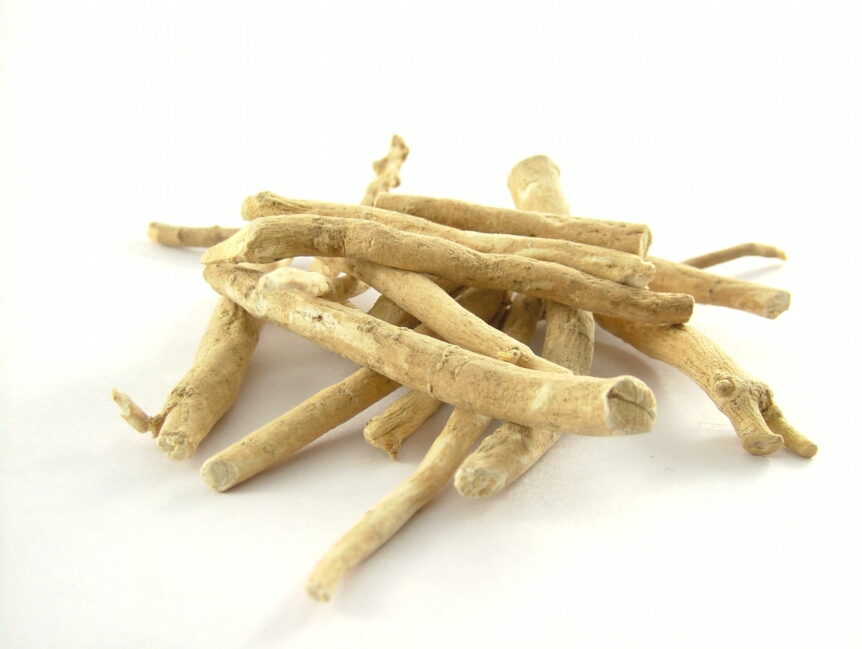Cortisol is a vital hormone produced by your adrenal glands—important for managing your sleep/wake cycle, energy, immune function, and stress responses. But when cortisol stays elevated (or conversely, drops too low), it can lead to fatigue, insomnia, mood swings, weight changes, hormonal imbalance, and immune issues. Thankfully, certain herbs have been shown in both clinical studies and traditional systems to help modulate cortisol and support resilience. Modulate is an important word here, everyone has a unique cortisol rhythm, which can be balanced for optimal health.
Below are some of the most well‑researched herbal allies, how they work, and how they might fit into a holistic plan.
Key Herbs & Adaptogens That Help Regulate Cortisol
Ashwagandha (Withania somnifera)
- Modern research: Meta‑analyses show ashwagandha significantly reduces serum cortisol, especially in people under stress. It also improves anxiety, sleep, and resilience.
- Traditional use: Revered in Ayurveda as a rejuvenative adaptogen. Commonly taken as powder, tincture, or capsules.
Rhodiola (Rhodiola rosea)
- Modern research: Shown to reduce stress‑induced cortisol elevations, lower fatigue, and improve cognitive resilience.
- Traditional use: Used in northern/Arctic folk medicine and modern herbalism. Often taken as standardized extract in the morning to avoid overstimulation.
Holy Basil (Tulsi, Ocimum tenuiflorum)
- Modern research: Studies suggest tulsi reduces cortisol, improves stress response, and provides antioxidant protection.
- Traditional use: Known in Ayurveda as the “Queen of Herbs.” Enjoyed as tea or tincture, especially during stressful times.
Chamomile & Lemon Balm

- Modern research: Both herbs may reduce cortisol and soothe the nervous system. Widely recognized for promoting relaxation and sleep.
- Traditional use: Common in Western herbal traditions, often used as teas in the evening.
Panax Ginseng (AKA: Ren shen in TCM)
- Modern research: Supports HPA axis regulation, helping modulate stress and lower cortisol in some studies.
How These Herbs Fit Into a Holistic Plan
Herbs are powerful, but they work best alongside a healthy lifestyle and balanced nutrition. Here are a few strategies to incorporate:
- Sleep & Rhythm: Aim to sleep before 10 pm to honor natural cortisol cycles.
- Nutrition: Stabilize blood sugar with protein, healthy fats, and fiber at each meal. Avoid large sugar spikes or long fasting gaps if adrenals are taxed.

- Stress Practices: Breath work, meditation, yoga, or qigong help regulate the nervous system, and are oh so lovely.
- Mindful Use of Herbs: Choose high‑quality extracts or teas. Start with lower doses and observe effects over time. Use our discount at fullscript where you can purchase high quality products direct from the manufacturers (not from amazon!)
Possible Risks & When to Seek Help
- Overuse or very high doses of adaptogens can cause overstimulation or insomnia.
- If cortisol is chronically low, certain stimulating adaptogens may not be appropriate.
- Professional guidance is advised if you take medications for thyroid, autoimmune, psychiatric, or hormone‑sensitive conditions.
- Functional testing (blood, saliva, or urine) can provide clarity about your unique cortisol rhythm and needs.
Cortisol balance is essential for energy, mood, immunity, and long‑term vitality. Herbs like ashwagandha, rhodiola, tulsi, and calming nervines such as chamomile or lemon balm can help restore balance when combined with lifestyle practices. By blending ancient herbal wisdom with modern functional approaches, you can create a personalized strategy for resilience and wellbeing.
Curious about your cortisol levels? Learn about our functional medicine offerings and schedule a discovery call.
We’re happy to help! 💚

